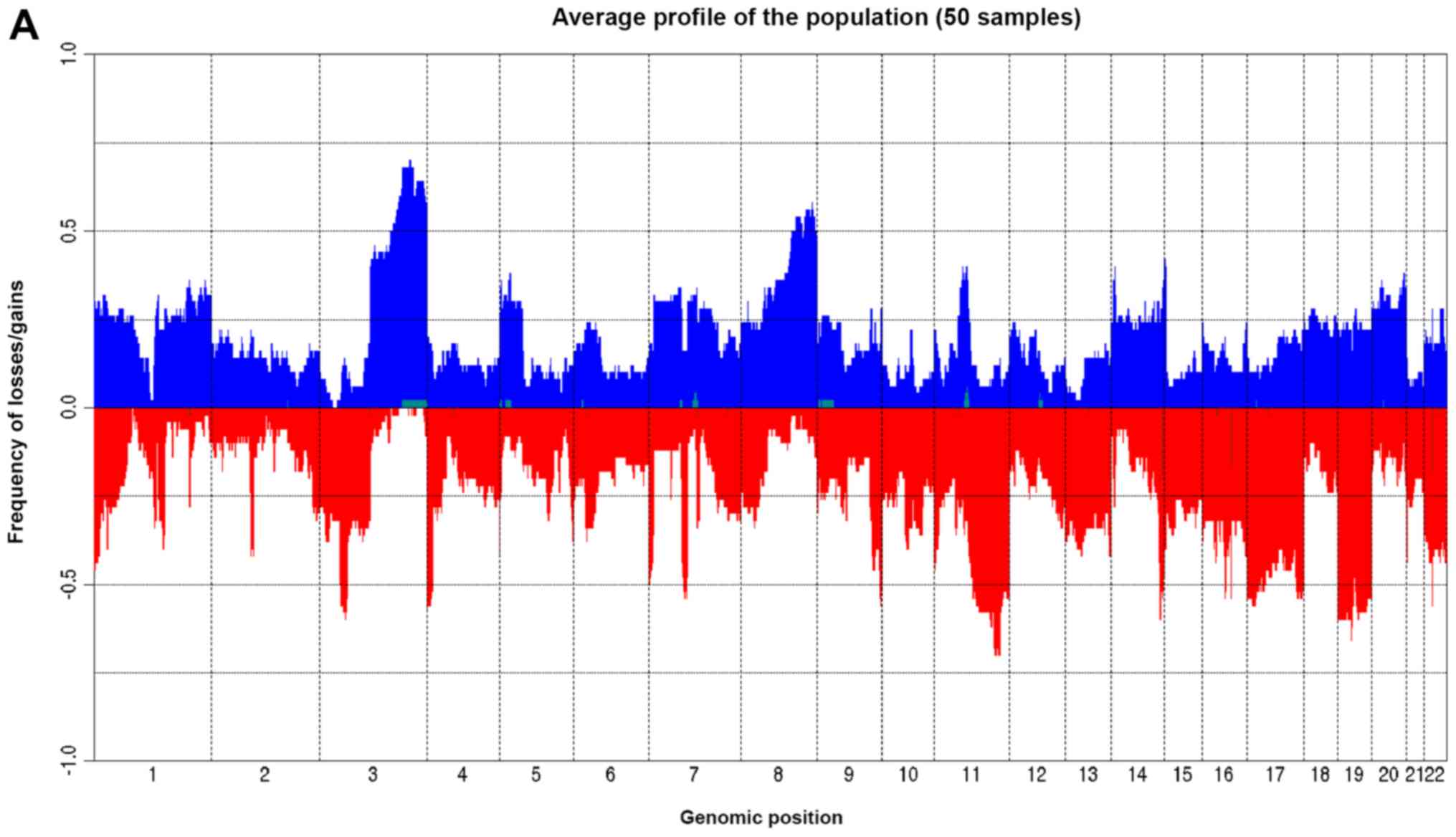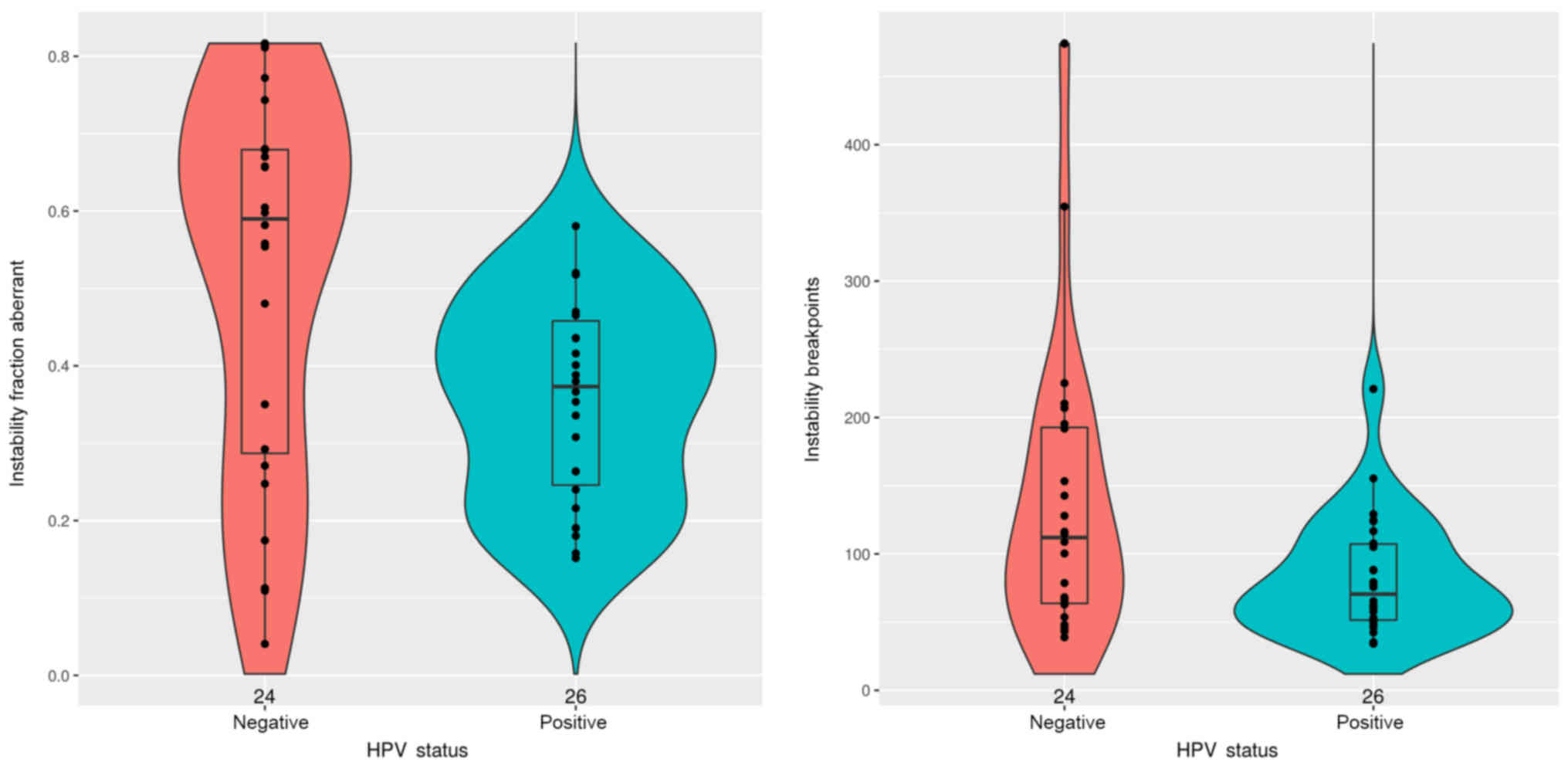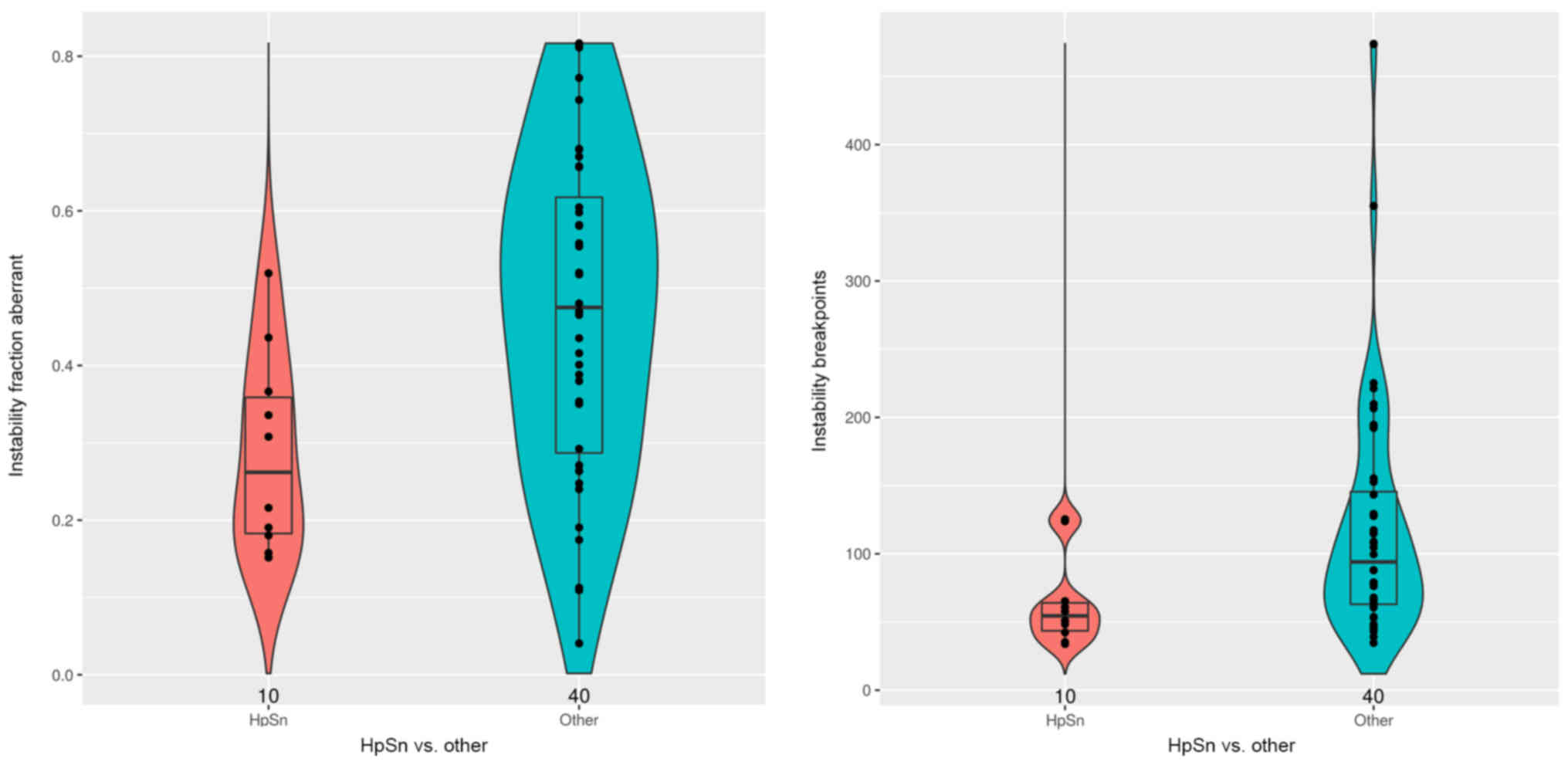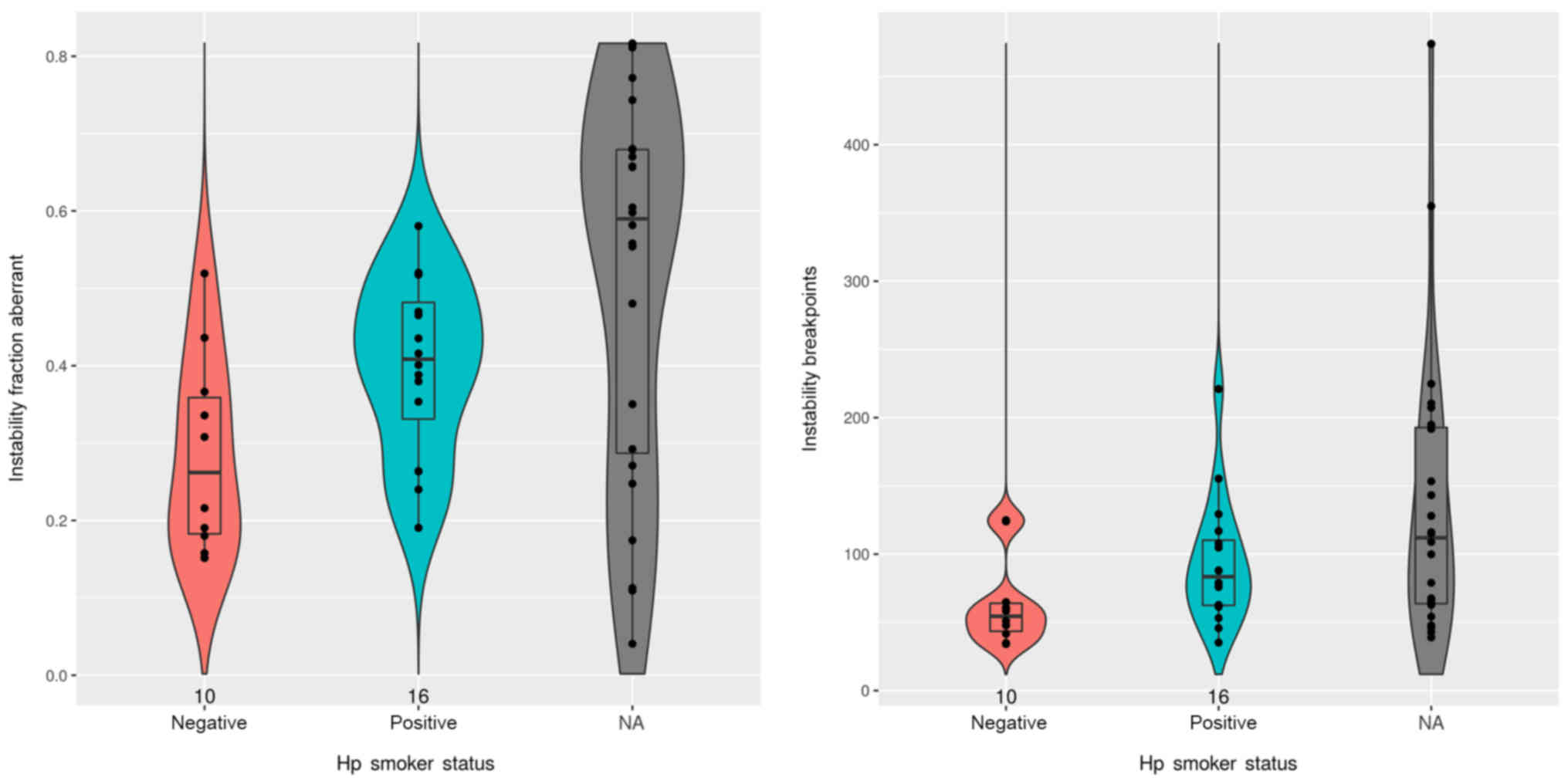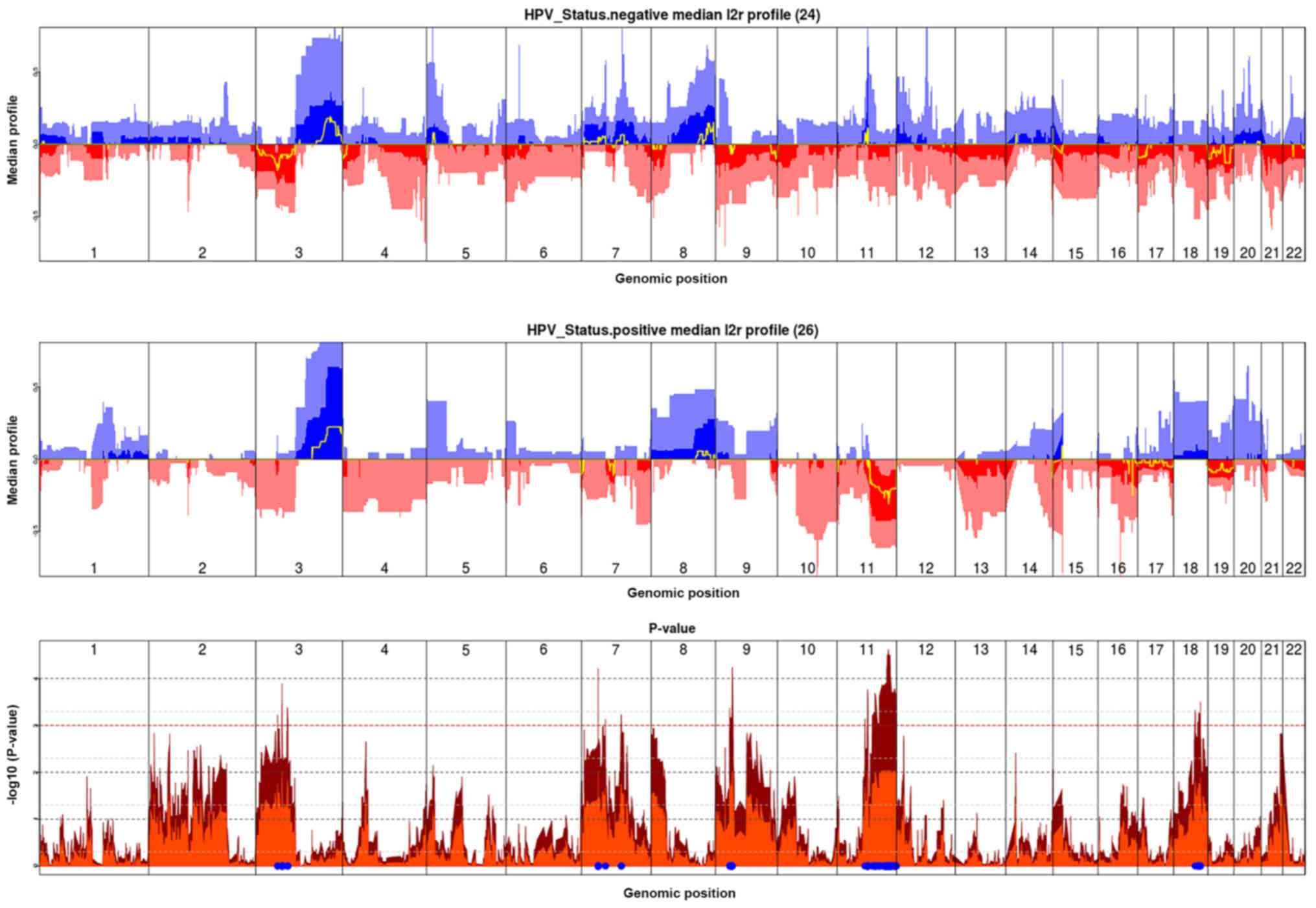|
1
|
Mork J, Lie AK, Glattre E, Hallmans G,
Jellum E, Koskela P, Møller B, Pukkala E, Schiller JT, Youngman L,
et al: Human papil-lomavirus infection as a risk factor for
squamous-cell carcinoma of the head and neck. N Engl J Med.
344:1125–1131. 2001. View Article : Google Scholar : PubMed/NCBI
|
|
2
|
Gillison ML and Shah KV: Human
papillomavirus-associated head and neck squamous cell carcinoma:
Mounting evidence for an etiologic role for human papillomavirus in
a subset of head and neck cancers. Curr Opin Oncol. 13:183–188.
2001. View Article : Google Scholar : PubMed/NCBI
|
|
3
|
Kreimer AR, Clifford GM, Boyle P and
Franceschi S: Human papillomavirus types in head and neck squamous
cell carcinomas worldwide: A systematic review. Cancer Epidemiol
Biomarkers Prev. 14:467–475. 2005. View Article : Google Scholar : PubMed/NCBI
|
|
4
|
Moody CA and Laimins LA: Human
papillomavirus oncoproteins: Pathways to transformation. Nat Rev
Cancer. 10:550–560. 2010. View
Article : Google Scholar : PubMed/NCBI
|
|
5
|
Leemans CR, Snijders PJF and Brakenhoff
RH: The molecular landscape of head and neck cancer. Nat Rev
Cancer. 18:269–282. 2018. View Article : Google Scholar : PubMed/NCBI
|
|
6
|
Lacau St Guily J, Rousseau A, Baujat B,
Périé S, Schultz P, Barry B, Dufour X, Malard O, Pretet JL, Clavel
C, et al Papillophar Group: Oropharyngeal cancer prognosis by
tumour HPV status in France: The multicentric Papillophar study.
Oral Oncol. 67:29–36. 2017. View Article : Google Scholar : PubMed/NCBI
|
|
7
|
Ang KK, Harris J, Wheeler R, Weber R,
Rosenthal DI, Nguyen-Tân PF, Westra WH, Chung CH, Jordan RC, Lu C,
et al: Human papillomavirus and survival of patients with
oropha-ryngeal cancer. N Engl J Med. 363:24–35. 2010. View Article : Google Scholar : PubMed/NCBI
|
|
8
|
Gillison ML and Restighini C: Anticipation
of the impact of human papillomavirus on clinical decision making
for the head and neck cancer patient. Hematol Oncol Clin North Am.
29:1045–1060. 2015. View Article : Google Scholar : PubMed/NCBI
|
|
9
|
Posner MR, Lorch JH, Goloubeva O, Tan M,
Schumaker LM, Sarlis NJ, Haddad RI and Cullen KJ: Survival and
human papillo-mavirus in oropharynx cancer in TAX 324: A subset
analysis from an international phase III trial. Ann Oncol.
22:1071–1077. 2011. View Article : Google Scholar : PubMed/NCBI
|
|
10
|
Ragin CC and Taioli E: Survival of
squamous cell carcinoma of the head and neck in relation to human
papillomavirus infection: Review and meta-analysis. Int J Cancer.
121:1813–1820. 2007. View Article : Google Scholar : PubMed/NCBI
|
|
11
|
Wittekindt C, Wagner S, Mayer CS and
Klussmann JP: Basics of tumor development and importance of human
papilloma virus (HPV) for head and neck cancer. GMS Curr Top
Otorhinolaryngol Head Neck Surg. 11:Doc092012.
|
|
12
|
Hong A, Zhang X, Jones D, Veillard AS,
Zhang M, Martin A, Lyons JG, Lee CS and Rose B: Relationships
between p53 mutation, HPV status and outcome in oropharyngeal
squamous cell carcinoma. Radiother Oncol. 118:342–349. 2016.
View Article : Google Scholar : PubMed/NCBI
|
|
13
|
Combes JD, Chen AA and Franceschi S:
Prevalence of human papillomavirus in cancer of the oropharynx by
gender. Cancer Epidemiol Biomarkers Prev. 23:2954–2958. 2014.
View Article : Google Scholar : PubMed/NCBI
|
|
14
|
Pytynia KB, Dahlstrom KR and Sturgis EM:
Epidemiology of HPV-associated oropharyngeal cancer. Oral Oncol.
50:380–386. 2014. View Article : Google Scholar : PubMed/NCBI
|
|
15
|
Huang SH, Xu W, Waldron J, Siu L, Shen X,
Tong L, Ringash J, Bayley A, Kim J, Hope A, et al: Refining
American Joint Committee on Cancer/Union for International Cancer
Control TNM stage and prognostic groups for human
papillomavirus-related oropharyngeal carcinomas. J Clin Oncol.
33:836–845. 2015. View Article : Google Scholar : PubMed/NCBI
|
|
16
|
Maxwell JH, Kumar B, Feng FY, Worden FP,
Lee JS, Eisbruch A, Wolf GT, Prince ME, Moyer JS, Teknos TN, et al:
Tobacco use in human papillomavirus-positive advanced oropharynx
cancer patients related to increased risk of distant metastases and
tumor recurrence. Clin Cancer Res. 16:1226–1235. 2010. View Article : Google Scholar : PubMed/NCBI
|
|
17
|
Hafkamp HC, Manni JJ, Haesevoets A, Voogd
AC, Schepers M, Bot FJ, Hopman AH, Ramaekers FC and Speel EJ:
Marked differences in survival rate between smokers and nonsmokers
with HPV 16-associated tonsillar carcinomas. Int J Cancer.
122:2656–2664. 2008. View Article : Google Scholar : PubMed/NCBI
|
|
18
|
Weller MA, Ward MC, Berriochoa C, Reddy
CA, Trosman S, Greskovich JF, Nwizu TI, Burkey BB, Adelstein DJ and
Koyfman SA: Predictors of distant metastasis in human
papillomavirus-associated oropharyngeal cancer. Head Neck.
39:940–946. 2017. View Article : Google Scholar : PubMed/NCBI
|
|
19
|
Smith EM, Rubenstein LM, Haugen TH,
Hamsikova E and Turek LP: Tobacco and alcohol use increases the
risk of both HPV-associated and HPV-independent head and neck
cancers. Cancer Causes Control. 21:1369–1378. 2010. View Article : Google Scholar : PubMed/NCBI
|
|
20
|
Sinha P, Logan HL and Mendenhall WM: Human
papillomavirus, smoking, and head and neck cancer. Am J
Otolaryngol. 33:130–136. 2012. View Article : Google Scholar
|
|
21
|
Duensing S and Münger K: The human
papillomavirus type 16 E6 and E7 oncoproteins independently induce
numerical and structural chromosome instability. Cancer Res.
62:7075–7082. 2002.PubMed/NCBI
|
|
22
|
Duensing S and Münger K: Mechanisms of
genomic instability in human cancer: Insights from studies with
human papillomavirus oncoproteins. Int J Cancer. 109:157–162. 2004.
View Article : Google Scholar : PubMed/NCBI
|
|
23
|
Schütze DM, Krijgsman O, Snijders PJ,
Ylstra B, Weischenfeldt J, Mardin BR, Stütz AM, Korbel JO, de
Winter JP, Meijer CJ, et al: Immortalization capacity of HPV types
is inversely related to chromosomal instability. Oncotarget.
7:37608–37621. 2016. View Article : Google Scholar : PubMed/NCBI
|
|
24
|
Mooren JJ, Kremer B, Claessen SM, Voogd
AC, Bot FJ, Peter Klussmann J, Huebbers CU, Hopman AH, Ramaekers FC
and Speel EJ: Chromosome stability in tonsillar squamous cell
carcinoma is associated with HPV16 integration and indicates a
favorable prognosis. Int J Cancer. 132:1781–1789. 2013. View Article : Google Scholar
|
|
25
|
Morrison LE, Jacobson KK, Friedman M,
Schroeder JW and Coon JS: Aberrant EGFR and chromosome 7 associate
with outcome in laryngeal cancer. Laryngoscope. 115:1212–1218.
2005. View Article : Google Scholar : PubMed/NCBI
|
|
26
|
Veltman JA, Bot FJ, Huynen FC, Ramaekers
FC, Manni JJ and Hopman AH: Chromosome instability as an indicator
of malignant progression in laryngeal mucosa. J Clin Oncol.
18:1644–1651. 2000. View Article : Google Scholar : PubMed/NCBI
|
|
27
|
Dahlgren L, Mellin H, Wangsa D,
Heselmeyer-Haddad K, Björnestål L, Lindholm J, Munck-Wikland E,
Auer G, Ried T and Dalianis T: Comparative genomic hybridization
analysis of tonsillar cancer reveals a different pattern of genomic
imbalances in human papillomavirus-positive and -negative tumors.
Int J Cancer. 107:244–249. 2003. View Article : Google Scholar : PubMed/NCBI
|
|
28
|
Klussmann JP, Mooren JJ, Lehnen M,
Claessen SM, Stenner M, Huebbers CU, Weissenborn SJ, Wedemeyer I,
Preuss SF, Straetmans JM, et al: Genetic signatures of HPV-related
and unrelated oropharyngeal carcinoma and their prognostic
implications. Clin Cancer Res. 15:1779–1786. 2009. View Article : Google Scholar : PubMed/NCBI
|
|
29
|
Jung AC, Briolat J, Millon R, de Reyniès
A, Rickman D, Thomas E, Abecassis J, Clavel C and Wasylyk B:
Biological and clinical relevance of transcriptionally active human
papillomavirus (HPV) infection in oropharynx squamous cell
carcinoma. Int J Cancer. 126:1882–1894. 2010. View Article : Google Scholar
|
|
30
|
Brierley JD, Gospodarowicz MK and
Wittekind C: TNM Classification of Malignant Tumours. 8th edition.
Wiley-Blackwell; New Jersey: pp. p2722017
|
|
31
|
Picard F, Lebarbier E, Hoebeke M, Rigaill
G, Thiam B and Robin S: Joint segmentation, calling, and
normalization of multiple CGH profiles. Biostatistics. 12:413–428.
2011. View Article : Google Scholar : PubMed/NCBI
|
|
32
|
Olshen AB, Venkatraman ES, Lucito R and
Wigler M: Circular binary segmentation for the analysis of
array-based DNA copy number data. Biostatistics. 5:557–572. 2004.
View Article : Google Scholar : PubMed/NCBI
|
|
33
|
Mermel CH, Schumacher SE, Hill B, Meyerson
ML, Beroukhim R and Getz G: GISTIC2.0 facilitates sensitive and
confident localization of the targets of focal somatic copy-number
alteration in human cancers. Genome Biol. 12:R412011. View Article : Google Scholar : PubMed/NCBI
|
|
34
|
Anantharaman D, Muller DC, Lagiou P,
Ahrens W, Holcátová I, Merletti F, Kjærheim K, Polesel J, Simonato
L, Canova C, et al: Combined effects of smoking and HPV16 in
oropharyngeal cancer. Int J Epidemiol. 45:752–761. 2016. View Article : Google Scholar : PubMed/NCBI
|
|
35
|
Chaturvedi AK, D'Souza G, Gillison ML and
Katki HA: Burden of HPV-positive oropharynx cancers among ever and
never smokers in the U.S. population. Oral Oncol. 60:61–67. 2016.
View Article : Google Scholar : PubMed/NCBI
|
|
36
|
Zevallos J, Yim E, Brennan P, Liu AY,
Taylor JM, Weissler M, Anantharaman D, Abedi-Ardekani B, Olshan AF
and Hayes NN: Molecular profile of human papillomavirus-positive
oropharyngeal squamous cell carcinoma stratified by smoking status.
Int J Radiat Oncol Biol Phys. 94:8642016. View Article : Google Scholar
|
|
37
|
Mirghani H, Lacroix L, Rossoni C, Sun R,
Aupérin A, Casiraghi O, Villepelet A, Lacave R, Faucher G, Marty V,
et al: Does smoking alter the mutation profile of human
papillomavirus-driven head and neck cancers? Eur J Cancer.
94:61–69. 2018. View Article : Google Scholar : PubMed/NCBI
|
|
38
|
Grønhøj C, Jensen DH, Agander T, Kiss K,
Høgdall E, Specht L, Bagger FO, Nielsen FC and von Buchwald C: Deep
sequencing of human papillomavirus positive loco-regionally
advanced oropha-ryngeal squamous cell carcinomas reveals novel
mutational signature. BMC Cancer. 18:6402018. View Article : Google Scholar
|
|
39
|
Masuda A and Takahashi T: Chromosome
instability in human lung cancers: Possible underlying mechanisms
and potential consequences in the pathogenesis. Oncogene.
21:6884–6897. 2002. View Article : Google Scholar : PubMed/NCBI
|
|
40
|
Hecht SS: Tobacco carcinogens, their
biomarkers and tobacco-induced cancer. Nat Rev Cancer. 3:733–744.
2003. View Article : Google Scholar : PubMed/NCBI
|
|
41
|
Hecht SS: Carcinogenicity studies of
inhaled cigarette smoke in laboratory animals: Old and new.
Carcinogenesis. 26:1488–1492. 2005. View Article : Google Scholar : PubMed/NCBI
|
|
42
|
Herzog CR, Desai D and Amin S: Array CGH
analysis reveals chromosomal aberrations in mouse lung
adenocarcinomas induced by the human lung carcinogen
4-(methylnitrosamino)-1-(3-pyridyl) -1-butanone. Biochem Biophys
Res Commun. 341:856–863. 2006. View Article : Google Scholar : PubMed/NCBI
|
|
43
|
Saletta F, Matullo G, Manuguerra M, Arena
S, Bardelli A and Vineis P: Exposure to the tobacco smoke
constituent 4-aminobi-phenyl induces chromosomal instability in
human cancer cells. Cancer Res. 67:7088–7094. 2007. View Article : Google Scholar : PubMed/NCBI
|
|
44
|
Hays LE, Zodrow DM, Yates JE, Deffebach
ME, Jacoby DB, Olson SB, Pankow JF and Bagby GC: Cigarette smoke
induces genetic instability in airway epithelial cells by
suppressing FANCD2 expression. Br J Cancer. 98:1653–1661. 2008.
View Article : Google Scholar : PubMed/NCBI
|















